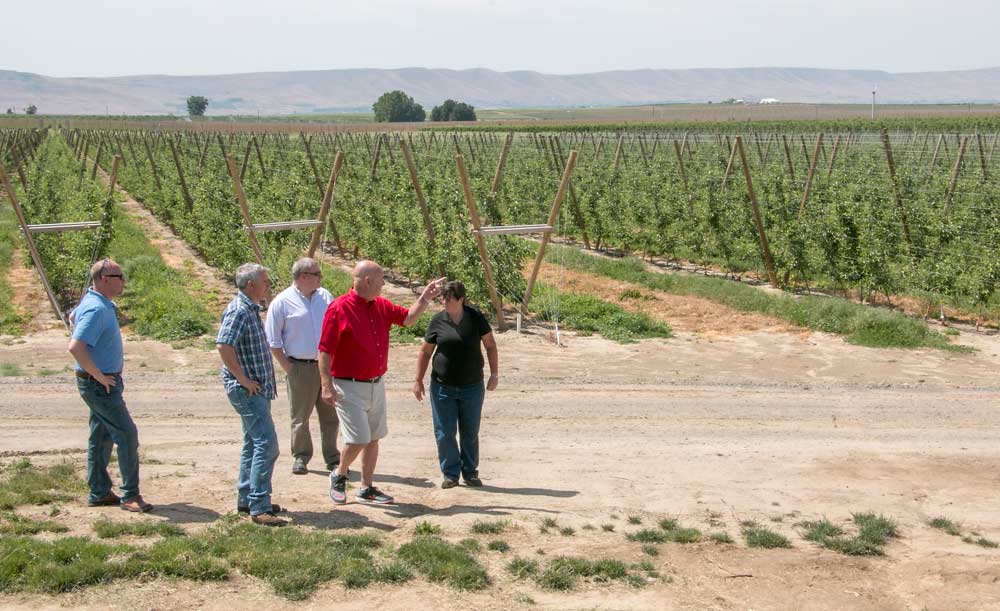
Fourth Leaf Fruit Co. staff members pitch custom packing services to grower Ed Webster, wearing red, at Webster’s Rothrock Farms north of Prosser, Washington, in June. Fourth Leaf, formerly Holtzinger Fruit, is one of the few packers in the nation that does not own its own orchards. (Ross Courtney/Good Fruit Grower)
Generally speaking, Ed Webster is happy with his packing company. Still, every year, he finds a block of fruit to shop out to a competitor, just to test the waters.
This year, he’ll do that with Fourth Leaf Fruit Co., a Washington packing house trying to reinvent itself by relying on its unusual position of custom packing exclusively.
The company, known as Holtzinger for the past 100 years, is one of only a few in the United States that doesn’t own its own orchards.
“I think I’ll give them my Galas,” said Webster, owner of Rothrock Farms, a small orchard north of Prosser, Washington.
Fourth Leaf staff have been pulling out the stops to woo growers this year, trying to bolster their position against consolidation and expansion elsewhere in the packing industry. Chelan Fruit and Borton Fruit merged earlier this year, while other companies build larger packing lines every year.
“It’s going to make it harder for independent growers,” David Henze, Fourth Leaf president, told Webster during a sales pitch in early June.
The company also is expanding its sales desk and has hired two new field representatives with a combined 50 years of farming experience.
On a shaded patio overlooking Webster’s vineyards, Henze and three other staff members discussed returns, commitment, feedback and other issues.
The company’s goal, Henze explained, is to combine the forces of smaller, independent growers to help them compete with larger firms. They are willing to help growers finance their operations and have discussed building collective worker housing for their growers.
Currently, Fourth Leaf keeps a stable of about 35 to 40 growers and specializes in finding export markets for older varieties, like Galas and Reds. The firm exports about 60 percent of its fruit — one of the attractions for Webster, who is also a retired airline pilot. “I have some older varieties,” he said, showing them his 1994 Gala trees.
No captive production
Packers that own no in-house, or captive, production are a rare breed in the era of vertical integration. That category does not include grower cooperatives, through which growers partner to distribute the costs of their own packing and share the profits.
Fourth Leaf is the only one in Washington. The packer, owned by a Seattle investment company since 2004, has only one small orchard it uses as a test plot, Henze said, and the company is looking to sell it.
California has no apple packers without their own orchards, said Alexander Ott, executive director of the California Apple Commission.
Michigan has Greenridge Fruit of Grand Rapids; Diane Smith, executive director of the Michigan Apple Committee, and Phil Schwallier of Michigan State University Extension could think of no others. Veteran sales officials in the Mid-Atlantic industry knew of only two packers without orchards in their area.
The packers use that rare detachment as a selling point.
“We’re not in competition with any of our growers,” said Tim Mansfield, director of sales and marketing for Sun Orchard Fruit Co. in Burt, New York, a mid-sized packer by Mid-Atlantic standards. The packer handles both veteran varieties and managed varieties, such as Honeybear’s Pazazz, for both high-end domestic and export markets.
Same goes for Hess Brothers of Lancaster, Pennsylvania. The company custom packs all varieties, including Crunch Time Apple Growers’ SnapDragon and RubyFrost, as well as a Hess Brothers exclusive called Sweet Cheeks, focusing mostly on the domestic market.
Though Hess Brothers owns none of its own fruit, it serves as the marketing agency for several packers that do, said Andy Figart, sales manager for Hess Brothers.
The concern of treating fruit unequally is one of perception more than reality, said Jon DeVaney, president of the Washington State Tree Fruit Association, the Yakima, Washington, industry organization.
During the shipping season, markets change dynamically, with prices rising and falling within days, if not hours. Thus, sales desks are under more pressure to find fruit quickly than favor one grower over another.
To counter the suspicion even further, most packers organize their growers into pools based on varieties and harvest timing. That also avoids sticking one grower with the short straw during an unlucky dip in the market.
Even Webster doesn’t suspect his packer of favoritism. But he likes the idea of using one that doesn’t even have the opportunity. That was enough to help convince him to give Fourth Leaf a test run.
“I’m willing to try anything,” he said. •
– by Ross Courtney






Leave A Comment